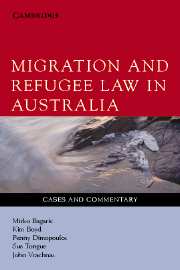Book contents
- Frontmatter
- Contents
- Detailed table of contents
- Table of cases
- Table of statutes
- 1 Thinking about migration law and national borders: An aspirational benchmark?
- 2 Introduction to Australian immigration law
- 3 Family and interdependency visas
- 4 Business and investment and skill-based visas
- 5 Temporary visas
- 6 Miscellaneous visas
- 7 Common visa requirements
- 8 Introduction to Australian refugee law: The Refugees Convention in Australian domestic law
- 9 Convention grounds
- 10 Persecution
- 11 Well-founded fear of persecution
- 12 Limits on protection of refugees: Cessation, exclusion exceptions and protection by another country
- 13 Cancellation of visas
- 14 Judicial review
- 15 Migration and human rights
- Index
12 - Limits on protection of refugees: Cessation, exclusion exceptions and protection by another country
Published online by Cambridge University Press: 05 June 2012
- Frontmatter
- Contents
- Detailed table of contents
- Table of cases
- Table of statutes
- 1 Thinking about migration law and national borders: An aspirational benchmark?
- 2 Introduction to Australian immigration law
- 3 Family and interdependency visas
- 4 Business and investment and skill-based visas
- 5 Temporary visas
- 6 Miscellaneous visas
- 7 Common visa requirements
- 8 Introduction to Australian refugee law: The Refugees Convention in Australian domestic law
- 9 Convention grounds
- 10 Persecution
- 11 Well-founded fear of persecution
- 12 Limits on protection of refugees: Cessation, exclusion exceptions and protection by another country
- 13 Cancellation of visas
- 14 Judicial review
- 15 Migration and human rights
- Index
Summary
Overview of exclusion, cessation and exceptions
The Refugees Convention sets out a number circumstances where the protection obligations by States towards refugees are limited or expunged. The duty of States to protect refugees is limited in seven broad circumstances. These are set out in the textbook, Migration and Refugee Law: Principles and Practice in Australia, in chapter 17.
As noted in chapter 17 of the textbook, the overarching rationale for the exceptions is either that the protection obligations to refugees only arise as a matter of last resort, or that a State's security interests trump its obligations to needy foreigners.
The circumstances in which a State meets its refugee obligations are relatively narrow and hence have not been discussed at length by the courts, with the main exception being the recent analysis of Article 1C(5). We now examine the sections that have been the subject of the most case analysis in greater detail.
Cessation: Article 1C
Article 1C relates to circumstances where a person who has been declared a refugee is no longer in need of protection due to changed circumstances. Article 1C is extracted in chapter 17 of the textbook.
Article 1C only becomes relevant in circumstances where a person has already been recognised as a refugee. The main situation where Article 1C becomes relevant is in relation to refugees who have been granted temporary protection visas whose visa has expired and who wish to apply for a further protection visa application. This potentially enlivens the scope of Article 1C(5).
- Type
- Chapter
- Information
- Migration and Refugee Law in AustraliaCases and Commentary, pp. 343 - 386Publisher: Cambridge University PressPrint publication year: 2006



